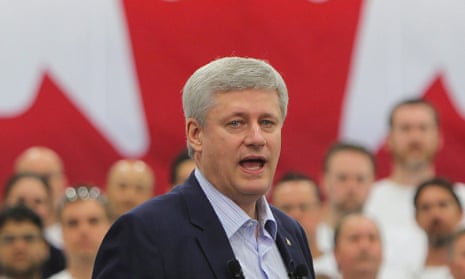Canada’s increasingly unpopular Conservative government stumbled through a bruising spring in which it enraged the nation and alienated some of its most faithful supporters. But the prime minister, Stephen Harper, is entering the race for re-election this autumn with the wind at its back.
The reason parallels the situation in the UK, where David Cameron returned with a majority of seats conjured from a bare plurality of votes. Opposition to Harper is evenly divided between two major opposition parties – the Liberals and the New Democrats – so the one-third of voters who vote Conservative are set once again to choose Canada’s national government.
“Most analysts here think that vote-splitting will help Harper and the Conservatives,” says Ted Morton, a former Conservative politician and senior fellow at the Manning Foundation thinktank in Calgary. As evidence, he points to the last election, in which Harper prefigured Cameron’s feat by winning a solid majority of seats with fewer than 40% of votes.
“Harper is still within reach of a minority, if not yet a majority,” Morton says.
The Conservatives gained fresh hope of a sort this week with the release of polls showing a strong surge in support for the leftwing New Democratic party following its surprise victory in a recent provincial election in Alberta, a staunchly conservative region often called the Texas of Canada.
The NDP gains have drawn the federal party tied with the Conservatives and the Liberal party in voter approval ratings as the long campaign begins, thus improving the odds that the increasingly restive majority of Canadians who oppose the Harper government will once again divide their votes and usher him to victory.
Outsiders will find little to distinguish between the two parties now promising a progressive alternative to the Conservatives.
Under their dashing but unproven young leader, Justin Trudeau, the Liberals have attempted a youth-centred revival promising a break from the complacency and cronyism of the party’s recent past.
The New Democrats – led by bearded, experienced Thomas Mulcair – have emulated Tony Blair’s New Labour by jettisoning their old-school socialist baggage and veering onto the centre-left terrain previously monopolized by the Liberals.
The one wedge that opens clear light between the two opposition leaders is their stated willingness to cooperate in an effort to defeat Harper. After some prevarication this spring, Trudeau ultimately rejected calls to form a coalition with the NDP in order to topple the Tories, citing personal differences with Mulcair. “His style is anchored in the old way of practising politics,” Trudeau said.
By contrast, Mulcair has openly embraced cooperation in an effort to distinguish himself from the Liberal leader, eldest son of the late prime minister Pierre Trudeau. “My first priority is to get rid of Stephen Harper,” he said in response to the Liberal leader’s rebuff. “The first priority of Justin Trudeau is Justin Trudeau.”
As deadlock looms and commentators descend into familiar demands for electoral reform, the leftwing campaign group Council of Canadians has launched a voter registration campaign, confident that increasing the last campaign’s historically low 61% turnout will accomplish the necessary work automatically.
“It’s a complicated situation,” says the council’s head, Maude Barlow. “But if we can get the issues out and get more people voting, we can get rid of Harper even if there isn’t any formal coalition ahead of time.”
Barlow accuses the Conservatives of hollowing out Canadian civil society, cancelling thousands of programmes, rescinding grants, removing regulations, shutting institutions and rescinding the tax-exempt status of annoying charities. “They don’t care about us and I don’t believe they try to represent us,” she says. “They only care about the 35% of the population they want to vote for them.”
Even former supporters have joined the attack. The government’s sweeping anti-terror legislation, seen as a political masterstroke when introduced, ultimately inspired a massive outcry that echoed from every establishment pulpit in the country. The government’s more recent attempt to announce clearly unattainable carbon-emission targets – and its subsequent U-turn inspired derision on both the right and left.
Partisan cooperation is unknown in Canadian election campaigns, according to Bob Rae, a senior statesman who served as the NDP premier of Ontario 20 years ago and more recently as the federal Liberal party’s caretaker leader following its 2011 electoral collapse under Michael Ignatieff.
“People are very determined to maintain the identity of their parties and to maintain their separateness,” Rae says, “and the intensity to do that seems to grow as the ideological differences between the parties becomes less and less significant.”
Despite that, Rae adds, there is a long history of Canadian parties cooperating to form governments following less than decisive elections. And despite the reliable perversity of a first-past-the-post electoral system in a multiparty democracy, there’s never any easy way to tell whom it may favour.
“First-past-the-post is a momentum play,” Rae says. “I think what we’re seeing, particularly with this long campaign, is that it’s quite possible any of the three parties will make a breakthrough.”

Comments (…)
Sign in or create your Guardian account to join the discussion